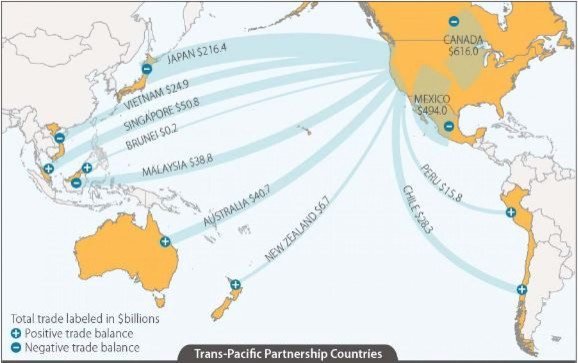Trans-Pacific Partnership (TPP) Trade Agreement Will Force China's Hand In Domestic Economic Reforms [ANALYSIS]

China wasn’t happy when it was excluded from the Trans-Pacific Partnership (TPP), but now that negotiations for the trade agreement led by the United States are set to conclude by year-end, China may be forced to make reforms in response to the potentially polarizing alliance, regardless of whether it plans to join the TPP.
The TPP began as the Pacific Three Closer Economic Partnership in 2003, involving just Singapore, New Zealand and Chile. The United States entered the ring in 2008 and proposed the TPP, which have since then come to include Brunei, Australia, Canada, Japan, Malaysia, Mexico, Peru and Vietnam. China is notably absent from the roster of the agreement, which would cover two-fifths of the world economy and one-third of interracial trade if completed.
Different from previous trade talks, the TPP aims not to just eradicate tariffs on goods and services, but also address the supply chain in areas including labor conditions, governmental procurement, state-owned enterprises, intellectual property and environmental protection. If a conclusion is reached -- which looks all but certain at this point -- the TPP would affect the core of a country’s business model, Caixin, a Chinese financial news outlet, reported on Wednesday.
The TPP would also signify an increased American presence in Asia, which would be a challenge at the doorstep that China cannot ignore, but China, it seems, has not decided just it should react. Over the years, Beijing’s attitude toward the partnership has changed from strong criticism to cautious support in large part because of its domestic slowdown. This year, the Ministry of Commerce said that China will conduct a study to analyze the pros and cons of joining the TPP.
An international arrangement like the TPP is a great opportunity to force China to reform, experts say, just as joining the WTO in 2001 brought about important changes, as there is currently a gap between TPP requirements and China’s economic reality, especially in how the central government manages its powerful but controversial state-owned enterprises.
As such, China is unlikely to join the current round of talks, and will join as a latecomer, after the partnership becomes reality, said Wang Yong, director of the Center for International Political Economy at Beijing University, according to Caixin, even though the deals at that time will be different, and will likely have a greater impact on the Chinese economy and trade.
In the meantime, China is promoting the Regional Comprehensive Economic Partnership (RCEP), a free trade agreement with its Southeast Asian neighbors that will focus on development. The rather low bars of the RCEP might mean a limited impact on the Chinese economy, Wang said, and will be unable to offset the external shock to China’s trade once the TPP is launched.
The only reasonable preparation for the shock is, once again, domestic reforms.
"The need for domestic reform in China is so pressing that the country is risking a loss of growth momentum," Wang said, according to Caixin.
© Copyright IBTimes 2024. All rights reserved.




















